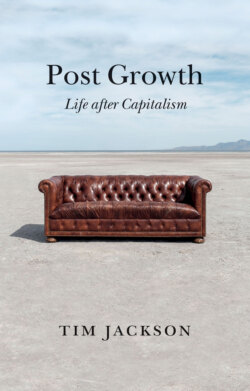Читать книгу Post Growth - Tim Jackson - Страница 27
Notes
Оглавление1 1. https://www.nytimes.com/2019/10/14/opinion/benioff-salesforce-capitalism.html?auth=login-email&login=email.
2 2. Translation from an extract from Luxemburg’s (1915) Junius Pamphlet in Waters 1970.
3 3. The expert in question was Anand Menon, Professor of European Politics and Foreign Affairs at Kings College London. He wrote about the experience in a review of 2016 for the UK in a Changing Europe Project, which can be found online at: http://ukandeu.ac.uk/2016-a-review/#.
4 4. On the impact of austerity, see the UN Special Envoy Philip Alston’s devastating report on the impacts of poverty in the UK: https://www.ohchr.org/Documents/Issues/Poverty/EOM_GB_16Nov2018.pdf. Post-truth: Davies 2019; see also: https://www.nytimes.com/2016/08/24/opinion/campaign-stops/the-age-of-post-truth-politics.html.
5 5. https://www.db.com/company/en/davos--the-world-economic-forum.htm.
6 6. Difficult year: https://www.nytimes.com/2020/01/30/business/deutsche-bank.html. Assets: https://ycharts.com/companies/DB/assets.
7 7. See Jackson 2019 for a detailed analysis of these statistics. Updated statistics may be found (for instance) at: https://data.worldbank.org/indicator/NY.GDP.MKTP.KD.ZG. See also: https://stats.oecd.org/Index.aspx.
8 8. See Jackson 2019. See also: https://www.ft.com/content/1043eec8-e9a7-11e9-a240-3b065ef5fc55.
9 9. Collier: https://www.weforum.org/agenda/2020/01/the-future-of-capitalism-by-paul-collier-an-extract/; see also Collier 2019. Benioff: https://www.cnbc.com/2020/01/21/stakeholder-capitalism-has-reached-a-tipping-point-says-salesforce-ceo-benioff.html; see also Benioff’s opinion piece for the New York Times (note 1). Davos manifesto: https://www.weforum.org/agenda/2019/12/davos-manifesto-2020-the-universal-purpose-of-a-company-in-the-fourth-industrial-revolution/.
10 10. The end of history: Fukuyama 1989 and 1992.
11 11. Woke capitalism: https://www.nytimes.com/2020/01/23/opinion/sunday/davos-2020-capitalism-climate.html.
12 12. Summers 2014; see also: https://www.ft.com/content/87cb15ea-5d1a-11e3-a558-00144feabdc0. New normal: see Galbraith 2014; Jackson 2019; Storm 2017.
13 13. The term ‘secular stagnation’ was first coined by Alvin Hansen in his Presidential Address to the American Economic Association in 1938 (Hansen 1939) to describe a situation in which economic fundamentals pointed to serious problems for the growth paradigm; see also Teulings and Baldwin 2014. Goldilocks: see Ford 2015.
14 14. Collier 2019, p. 4; see also the Collier WEF link in note 9.
15 15. The business of business: Friedman 1962.
16 16. Smith 1776, Book I, Chapter XI, Part III.
17 17. https://www.ft.com/content/10b7f566-f3fd-11e8-ae55-df4bf40f9d0d. The question of whether we can draw lessons from the past in conceiving a new vision for the future is an important one. We’ll return to it at various point in this book. The very least we would have to say here is that any proposals, however successful in a previous era, must also be compatible with the changed conditions in which we seek to employ them anew. Wolf’s point is that appealing to a time when they worked before is no guarantee at all that they will work again.
18 18. ‘Deficit spending’ refers to an increase in government spending beyond its tax revenues. It was the principal policy recommendation of the economist John Maynard Keynes in the wake of the Great Depression of the 1930s and the foundation for Franklin D. Roosevelt’s ‘New Deal’. ‘Stagflation’ is the term used to describe simultaneously high levels of both inflation and unemployment. It occurred in particular during the oil crises of the 1970s. I return to the politics of the deficit and of sovereign debt in Chapter 9.
19 19. Savage indictment: https://www.dramaonlinelibrary.com/playtext-overview?docid=do-9781408169520&tocid=do-9781408169520-div-00000121. Serious Money: Churchill 1990, p. 88.
20 20. Exam text: https://www.ocr.org.uk/Images/260990-caryl-churchill-topic-exploration-pack.pdf.
21 21. For a fuller history of these developments, see Jackson 2017, Chapter 2; see also Peston 2017; Turner 2015; Wolf 2015.
22 22. On inequality, see Jackson 2019; Piketty 2014; Piketty et al. 2016.
23 23. Summers 2014, p. 68.
24 24. Unwieldy debt: Felkerson 2011. Austerity: see Stuckler and Basu 2014. Health inequality: Marmot et al. 2020.
25 25. Communist growth: https://www.scmp.com/economy/china-economy/article/3040822/china-2020-gdp-growth-target-be-set-around-6-cent-top.
26 26. Marx 1867, Vol. 1, Chapter 24. On ‘bad capitalism’, see Baumol et al. 2007. On the growth imperative, see Heilbronner 1985. See also Jackson and Victor 2015.
27 27. Accumulation of Capital: Luxemburg 1913. Junius Pamphlet: see Waters 1970.
28 28. The market in this paragraph really just means the total set of exchanges – the buying and selling of goods and services – across the whole economy.
29 29. See Goodwin 1967.
30 30. Summers (2014) has been the most vocal advocate of the argument from demand, which he attributes mainly to loose monetary policy. Gordon (2016) argues that the problem is on the supply side. Early attempts to ascertain the causes of a slowing down in the growth rate (e.g. Kaldor 1966) identify a key element in the dynamic as being the composition of demand as economies mature.
31 31. See Ayres and Warr 2009; Jackson 2019.
32 32. Streeck 2016, p. 71; see also: https://newleftreview.org/issues/II87/articles/wolfgang-streeck-how-will-capitalism-end.
